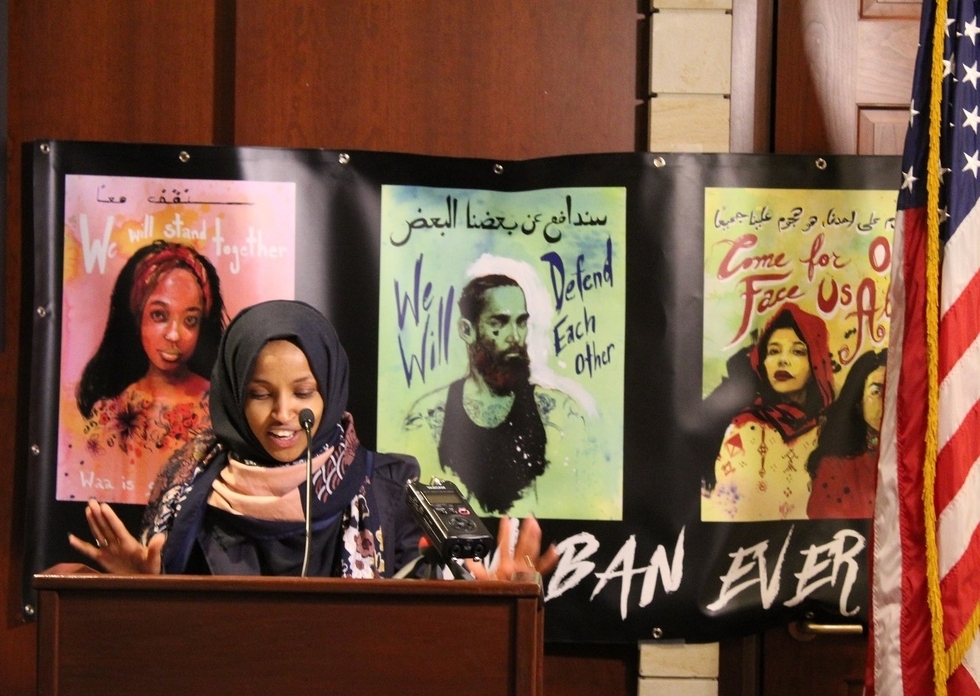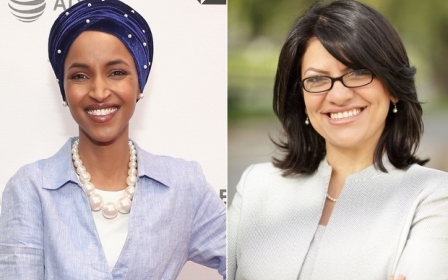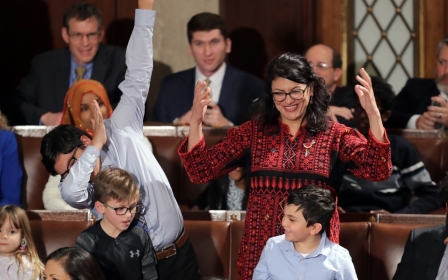Ilhan Omar's 'Benjamins' tweet storm: 'Criticising AIPAC is not anti-Semitic'

It was only a matter of time before the gloves came off.
Following the election of Somali-American Ilhan Omar and Palestinian-American Rashida Tlaib into the US Congress in November, the arrival of these two Muslim women in Washington has seen them closely scrutinised by opponents and critics over their willingness to challenge the political consensus.
When Omar wrote in a tweet on Sunday night that members of the US government were being influenced by the American Israel Public Affairs Committee, or AIPAC, to support the state of Israel, a volley of criticism and outrage followed, dominating social media platforms and US media on Monday.
Pro-Israel advocates and politicians from both the Republican and Democratic parties accused Omar of anti-Semitism, arguing that her comments alluded to an age-old caricature of "Jewish money" and "Jewish control" of governments that has been used as a means to persecute and demonise Jews.
But others say the accusations are aimed at Omar's pro-Palestinian political stance.
'Ilhan Omar’s and Rashida Tlaib’s presence disrupts a status quo of bipartisan, uncritical support of Israel'
-Noura Erakat
“I think what has happened is emblematic of a number of things. One is just an explicit establishment response to a Muslim in Congress who is critical of Israel,” Noura Erakat, a human rights lawyer and academic based at Virginia's George Mason University, says.
“Ilhan Omar’s and Rashida Tlaib’s presence disrupts a status quo of bipartisan, uncritical support of Israel,” Erakat told MEE.
Row kicks off
Let’s start from the beginning.
On Sunday, the Intercept's journalist Glenn Greenwald criticised Kevin McCarthy, a Republican politician, for threatening to punish Tlaib and Omar for previous anti-Israel remarks.
Omar retweeted Greenwald with the comment “it’s all about the Benjamins baby.”
Omar’s reference to “Benjamins” paid homage to a mid-90s rap song of the same name in which the play on the name Benjamin referred to “money”; the $100 note has the face of one of America’s founding fathers, Benjamin Franklin.
Batya Ungar-Sargon, opinion editor of Forward, replied to Omar, asking who she thought was "paying American politicians to be pro-Israel though I think I can guess [sic].”
Omar replied: “AIPAC.”
'Unfortunate choice of words'
Yonah Lieberman, a spokesperson for IfNotNow, a Jewish movement that focuses on urging Jewish Americans to withdraw support for Israel's occupation of Palestinian territory, told MEE that it was "an unfortunate choice of words".
"I think it is possible to simultaneously recognise that AIPAC uses traditional lobbying tactics, including raising money for politicians - so that they then don’t question Israeli policy - while also recognising that Ilhan Omar had an unfortunate word choice that played to anti-Semitic stereotypes about Jewish money controlling politicians," said Lieberman.
“I don’t think Omar is anti-Semitic and she has apologised - which is courageous in itself. But she could have made that same point - that AIPAC has undue influence over American foreign policy - without playing into those tropes.”
AIPAC, formed in 1951 by Jewish American leaders, has 100,000 members in the US.
Though AIPAC does not endorse or contribute directly to political candidates, it encourages its members to do so.
As an organisation that focuses on pushing through specific Israel-friendly bills and sponsoring government visits to Israel, it manages to wield tremendous influence over US politicians. AIPAC itself says that the "United States Congress has provided Israel with the strongest support of any institution in the world."
In 2018, it spent $3.5m on lobbying alone.
But AIPAC is in no way the only pro-Israel organisation lobbying government, nor is it the biggest contributor to the US political establishment.
According to Quartz, the Adelson family, with Eastern European Jewish ancestry, dwarfs AIPAC's numbers with a $118m contribution to the Republican Party in the 2018 midterms alone. The Adelsons are also said to have been influential in US President Donald Trump’s decision to move the US embassy from Tel Aviv to Jerusalem, a move that was applauded by AIPAC.
'Stigmatise our community'
Responding to Omar's comments about AIPAC, the pro-Israel lobby group, J-StreetPac, said there “is no doubt that money often plays a major role in our political system… elected officials must be extremely aware that tropes about Jewish money and political influence have been used for centuries to target and stigmatise our community.
'I don’t think Omar is anti-Semitic and she has apologised - which is courageous in itself. But she could have made that same point - that AIPAC has undue influence over American foreign policy - without playing into those tropes'
- Yonah Lieberman
“This kind of rhetoric and imagery has never been the exclusive province of left or right, and both Democrats and Republicans should be hyper-vigilant to ensure that it has no place in our political discourse,” J-StreetPac, an organisation that describes itself as “the political home for pro-Israel, pro-peace Americans,” said.
But Rebecca Vilkomerson, executive director of Jewish Voices for Peace, an organisation that opposes anti-Jewish, anti-Muslim, and anti-Arab bigotry and oppression, told MEE that it was “not anti-Semitic to say that a lobby group is using money to influence politics”.
Vilkomerson expressed concern that any and every type of criticism of the Israeli state was now being masked by accusations of anti-Semitism.
“AIPAC does not even identify itself as a Jewish organisation any more. Some of its biggest supporters - by some reports - are actually non-Jews. So on every level it seems to me that we are talking about a fact here,” she said.
"Lobby groups use money to influence. And this is a problem with our political system. And it’s worth talking about.”
‘Anti-Semitism is on the rise’
Lieberman says the response to Omar is partially to do with the fact that anti-Semitism is on the rise in “a very chaotic moment in American history”.
“American Jews are having a very public conversation about the rise of anti-Semitism in this country… we are on edge.
"What we are seeing here is how the right wing is playing off the legitimate fear that we have in order to divide and conquer the progressive movement.”
'AIPAC does not even identify itself as a Jewish organisation any more. Some of its biggest supporters - by some reports - are actually non-Jews'
- Rebecca Vilkomerson
Racism, including anti-Jewish bigotry, Islamophobia, homophobia and hate crimes against African-Americans have been on the rise in the US since 2016.
In 2018, the New York Police Department (NYPD) said there was a 22 percent increase in anti-Jewish hate crimes over the course of the year.
Erakat, the human rights lawyer, agrees that no one is denying that the trope exists and is used, but says that “nothing in what Omar said suggested that [trope]”.
“She explicitly said 'AIPAC' - which is a self-identified special interest group which operates as an organisation that contributes to members of Congress.”
“If it was truly concerns for anti-Semitism, this conversation would be very different. But watch how nobody will touch it except summarising what has happened.
"No one is going to try and explain what is anti-Semitism and what is anti-Zionism, and how the Israeli lobby has collapsed these two things in order to advance its agenda.”
Agreeing with Erakat's analysis, Lieberman says that those at the forefront of criticising Omar are unlikely to have much to say about the Israeli occupation and the rise of anti-Semitism.
“These people are more interested in supporting Israel no matter if it is right or wrong - instead of tackling the rise of the white nationalism movement, whose very roots are anti-Semitic,” he said.
An apology
On Monday afternoon, following Omar's tweet, Nancy Pelosi, the Democratic speaker of the House of Representatives, released a statement calling on the congresswoman to apologise.
Within a few hours, Omar issued an apology.
“I think given the fact that her point was being obscured, it was good that she apologised," Vilkomerson, from Jewish Voices for Peace, said.

"She is being responsive in good faith, to those who say it offended them. Hopefully it will allow people to focus on the substance."
Commenting on the relentless criticism of Omar, Dave Zirin, a prominent columnist with the Nation, wrote in a tweet: “As a Jew, I want to welcome anyone who wants to criticise a lobbying coalition funded by arms manufacturers, evangelical Christians, and allies of the right wing edge of Israeli politics.
"Criticising AIPAC is not anti-Semitic and it’s absurd that this even needs to be said.”
Similarly, Alex Kotch, a senior investigative journalist with the Sludge, wrote that: “Pointing out these campaign finance facts is not anti-Semitic. It's relevant information that poses potential conflicts of interest among our elected officials.
"Labelling everything involving both Jewish people and money as inherently anti-Semitic is intellectually dishonest.”
Lieberman, from IfNotNow, said: "We know she and [Rashida] Tlaib and even Alexandria Ocasio-Cortez are being watched and scrutinised and people are waiting for them to make mistakes, even more so than Trump.
“What I can tell you is that as young American Jews we are still standing with Ilhan Omar and we are still fully behind her opposition to the racist and immoral occupation of Palestinian territories."
Middle East Eye propose une couverture et une analyse indépendantes et incomparables du Moyen-Orient, de l’Afrique du Nord et d’autres régions du monde. Pour en savoir plus sur la reprise de ce contenu et les frais qui s’appliquent, veuillez remplir ce formulaire [en anglais]. Pour en savoir plus sur MEE, cliquez ici [en anglais].





